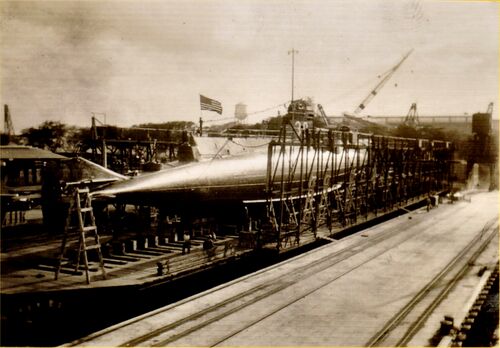S-30 through S-41: Difference between revisions
From PigBoats.COM
Pbcjohnston (talk | contribs) mNo edit summary |
Pbcjohnston (talk | contribs) Started formatting the 30 series page |
||
| Line 1: | Line 1: | ||
[[File:S-Boat Header 1.jpg|center]] | [[File:S-Boat Header 1.jpg|center]] | ||
=== <big>Design and Construction Notes</big> === | |||
<div style="text-align: justify;"><span style="color:#00008B">These 12 submarines made up the second contract awarded to the Electric Boat Company (EB), and all were assigned for construction to an EB sub-contractor, Union Iron Works in San Francisco. By the time of the start of construction, UIW had been sold to Bethlehem Steel and it was known as Bethlehem San Francisco (BSF). The boats were near duplicates of their 20 series sisters, with the only noticeable difference being the smaller, rounded shape of the bow plane pivot fairings. Like the boats built by Bethlehem Quincy, the 30 series boats were all of the standard EB single hull design with an axial mounted rudder, stern planes, and propellers. BSF got an immediate start on the boats and worked in parallel with the Quincy yard. In fact, S-30 was the 2nd of the EB boats to be commissioned, following S-1 by only four months. | |||
These boats suffered from the same engine problems as the Quincy built boats, with their introduction into active service being greatly delayed until the solution of a larger diameter crankshaft was decided upon and implemented. Once fixed, these boats provided great service to the fleet, and they could be found in every theater that the U.S. Navy operated in. | |||
The initial lack of adequate numbers of fleet boats meant that the Navy relied heavily on these submarines in the early months of the war. Most made many war patrols, with the high operational tempo being very hard on these then 20 year old submarines. Two of them were lost. The remainder served until the end of the war, receiving many upgrades like air conditioning, radar, rebuilt superstructures, and additional guns. The remaining boats were quickly discarded at the end of the war, but they had proved their worth by stepping up for war duty when called for.</span></div> | |||
=== <big>S-30 (SS-135)</big> === | === <big>S-30 (SS-135)</big> === | ||
[[File:S-30 New London.jpg|left|500px|Photo in the private collection of Ric Hedman.]] | |||
<div style="text-align: justify;"><span style="color:#00008B"> | <div style="text-align: justify;"><span style="color:#00008B">S-30 hauled out in the floating drydock at Submarine Base New London, Groton, CT. The date is approximately 1935-1936. S-30 has received all of the safety improvements following the [[Notable Submarine Accidents|'''S-4 disaster''']]. Her aft superstructure skeg has been cut away forward of the rudder, an escape hatch has been installed in the motor room, and a rescue marker buoy has been installed at the new aft end of the superstructure.</span> | ||
[[S-30|See More S-30 photos]] | [[S-30|See More S-30 photos]] | ||
Revision as of 20:41, 7 August 2023

Design and Construction Notes
These 12 submarines made up the second contract awarded to the Electric Boat Company (EB), and all were assigned for construction to an EB sub-contractor, Union Iron Works in San Francisco. By the time of the start of construction, UIW had been sold to Bethlehem Steel and it was known as Bethlehem San Francisco (BSF). The boats were near duplicates of their 20 series sisters, with the only noticeable difference being the smaller, rounded shape of the bow plane pivot fairings. Like the boats built by Bethlehem Quincy, the 30 series boats were all of the standard EB single hull design with an axial mounted rudder, stern planes, and propellers. BSF got an immediate start on the boats and worked in parallel with the Quincy yard. In fact, S-30 was the 2nd of the EB boats to be commissioned, following S-1 by only four months.
These boats suffered from the same engine problems as the Quincy built boats, with their introduction into active service being greatly delayed until the solution of a larger diameter crankshaft was decided upon and implemented. Once fixed, these boats provided great service to the fleet, and they could be found in every theater that the U.S. Navy operated in.
The initial lack of adequate numbers of fleet boats meant that the Navy relied heavily on these submarines in the early months of the war. Most made many war patrols, with the high operational tempo being very hard on these then 20 year old submarines. Two of them were lost. The remainder served until the end of the war, receiving many upgrades like air conditioning, radar, rebuilt superstructures, and additional guns. The remaining boats were quickly discarded at the end of the war, but they had proved their worth by stepping up for war duty when called for.S-30 (SS-135)

S-30 hauled out in the floating drydock at Submarine Base New London, Groton, CT. The date is approximately 1935-1936. S-30 has received all of the safety improvements following the S-4 disaster. Her aft superstructure skeg has been cut away forward of the rudder, an escape hatch has been installed in the motor room, and a rescue marker buoy has been installed at the new aft end of the superstructure.
S-31 (SS-136)
words
S-32 (SS-137)
words
S-33 (SS-138)
words
S-34 (SS-139)
words
S-35 (SS-140)
words
S-36 (SS-141)*
words
S-37 (SS-142)
words
S-38 (SS-143)
words
S-39 (SS-144)*
words
S-40 (SS-145)
words
S-41 (SS-146)
words
Return to the S-class page | Return to the Submarine Classes page
(*) Indicates a boat lost during World War II.
Page created by:
Ric Hedman & David Johnston
1999 - 2023 - PigBoats.COM©
Mountlake Terrace, WA, Norfolk, VA
webmaster at pigboats dot com